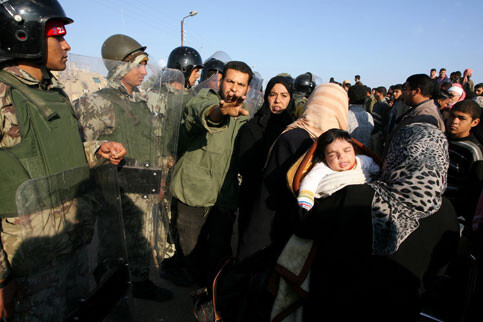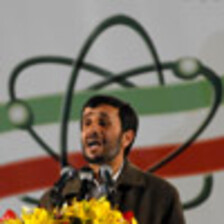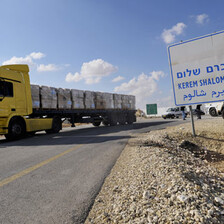The Electronic Intifada 30 January 2008

Egyptian border guards prevent Palestinians from crossing into Egypt from the southern Gaza Strip, 25 January 2008. (MaanImages)
JERUSALEM, 31 January (IPS) - Already testy relations between Jerusalem and Cairo have frayed further in the last week as hundreds of thousands of Gazans have poured through a hole blasted in the Egypt-Gaza border fence, in a bid to escape a suffocating blockade imposed by Israel on the coastal strip.
With fuel and medical supplies running low as a result of sanctions implemented by Israel ostensibly in response to the firing of rockets by Palestinian militants from Gaza into Israel, Hamas members toppled the steel wall on the border with Egypt last week. Once on the Egyptian side of the border, Gaza residents were able to stock up on much-needed supplies before heading back home.
Israeli leaders, incensed that Egyptian President Hosni Mubarak had not resurrected the wall and stopped the Gazans from entering, began suggesting that they would relinquish control of the strip altogether, leaving Egypt lumped with responsibility for the 1.5 million inhabitants of Gaza.
“We need to understand that when Gaza is open to the other side, we lose responsibility for it,” said Israel’s deputy defense minister Matan Vilnai. “So we want to disconnect from it.
“We want to stop supplying electricity to them, stop supplying them with water and medicine, so that it would come from another place.”
Israel controls the Gaza coastline, its airspace and its borders, except for the section of the border with Egypt, enabling it to impose crippling sanctions in a move aimed at halting the almost daily firing of rockets into towns in southern Israel. Israel supplies Gaza with 70 percent of its electricity, and controls the flow of food, medical supplies and water into the strip.
Vilnai’s remarks were understood as a clear insinuation that Egypt, having allowed its border with Gaza to be breached, should assume responsibility for the strip, including the supply of power and the flow of humanitarian aid. Since Hamas seized full control of Gaza in June last year — having vanquished Fatah, the party of Palestinian Authority President Mahmoud Abbas — Egypt has largely kept its border with Gaza sealed.
Israel is concerned that in addition to the food, fuel and livestock that Gaza residents have been bringing back into the strip from Egypt, weapons are also being brought in by militants. The Israeli government also issued a travel advisory to all Israelis on vacation in the Sinai Desert — the area abutting the Gaza border — to head back home immediately for fear they might be attacked by Palestinian militants who had crossed the border.
Relations between the two countries, who have had diplomatic ties since signing a full peace treaty in 1979, were tense even before the border incident. For some time, Israeli leaders have been angry with Egyptian President Hosni Mubarak, who they believe is not doing enough to stop the smuggling of weapons through tunnels from the Egyptian side of the border into Gaza. A few weeks ago, Israeli foreign minister Tzipi Livni said Egypt was doing a “terrible” job in policing the border.
Israel was also angry with Mubarak a few weeks ago when Egypt allowed Muslim Hajj pilgrims associated with Hamas back into Gaza. Israel insists the pilgrims bring money back into the strip for the Hamas government, which has been crippled by international sanctions.
Mubarak, though, does not fear Hamas any less than Israel does. He is concerned that with Hamas having taken control of Gaza, it could embolden Islamic groups in his country. But, facing growing public pressure to assist the Palestinians in Gaza in the face of the Israeli-imposed blockade, the Egyptian leader instructed troops at the border not to stop Gazans from surging through the hole in the toppled border wall.
Egypt also has its own bone to pick with Israel, after Israeli supporters in the US took a video tape to Congress showing Egyptian soldiers turning a blind eye to arms smuggling into Gaza.
Now, the comments by Vilnai have sparked fears in Egypt that Israel might try to relinquish responsibility for the 1.5 million residents of Gaza, which was controlled by Egypt until Israel captured the area in the 1967 War. The remarks have also generated concern among Palestinians that Israel, which pulled its military out of Gaza and evacuated all settlements there in 2005, might try and separate between the West Bank and the strip.
Immediately after Vilnai made his remarks, Abbas declared that if Israel did try to sever the West Bank, which is under his control, from Hamas-controlled Gaza, it would have “grave consequences” for peace talks, which were renewed just last month after a seven-year impasse.
In the last few days, Egypt has begun resurrecting the wall along the border. But while Israel and Egypt might both be deeply concerned by Hamas’s takeover of the strip, their divergent interests are likely to ensure that the latest border spat is not the last Gaza-induced diplomatic tiff between the two countries.
All rights reserved, IPS - Inter Press Service (2008). Total or partial publication, retransmission or sale forbidden.
Related Links





